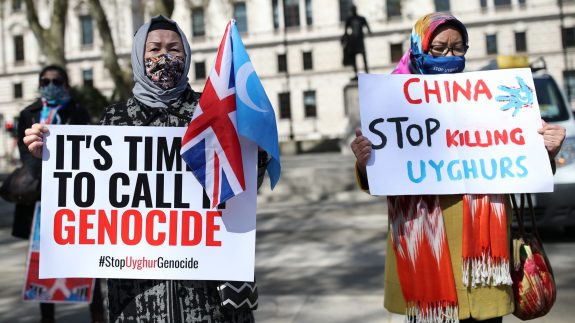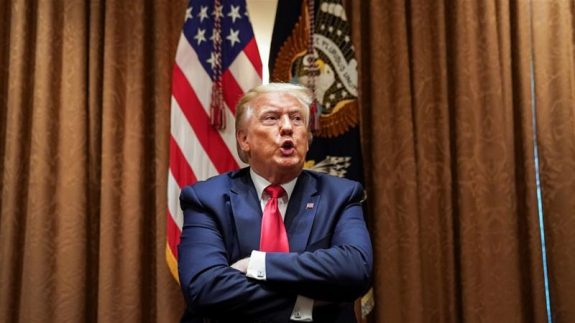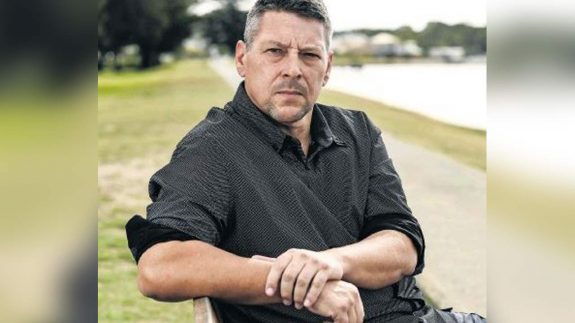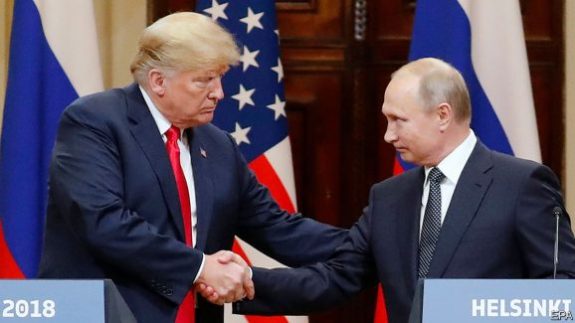The Magnitsky Act
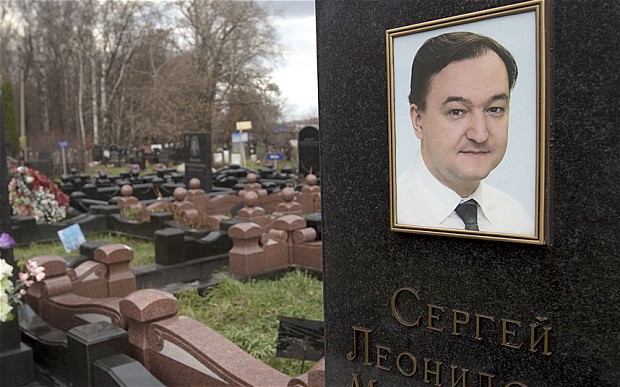
Sergei Magnitsky was a Russian tax accountant who acted for an American client Bill Browder who went to Russia as a hedge fund trader. He discovered an incredible identity theft – fraud – that Bill’s companies had been used without his knowledge by a syndicate of crooked police and tax officials, who used them to steal $250M of public money.
And when he reported this massive fraud, the investigators were the very police who’d pulled it off. They arrested him, kept him in prison for a year without trial, thanks to lick-spittle judges who ignored the law and ignored his failing health. And he was finally beaten to death in prison by the criminals in the state who had committed the crime that he had informed on.
Bill Browder launched a massive campaign in the West to identify and condemn the 30 or 40 people morally and legally responsible for Sergei’s death – the police, the tax officials, who were now busily laundering their money through Cyprus and London, and the supine judges who had cruelly denied him bail. Browder named them and shamed them in a massive campaign. One policeman, on a salary of $300 a month, paid $2M to English lawyers to sue Bill for libel. The case was eventually thrown out and Bill took his campaign to the United States.
In June 2012, the United States House Committee on Foreign Affairs reported to the House a bill called the Sergei Magnitsky Rule of Law Accountability Act of 2012. The main intention of the law was to punish Russian officials who were thought to be responsible for the death of Sergei Magnitsky by prohibiting their entrance to the United States and use of their banking system.
In a rather puerile, self-defeating response to adoption of the Magnitsky Act in December, the Russian government denied Americans adoption of Russian children, issued a list of US officials prohibited from entering Russia, and posthumously convicted Magnitsky as guilty.
Australian expatriate jurist Geoffrey Robertson, who represented Browder, has described the Act as “one of the most important new developments in human rights”. He says it provides “a way of getting at the Auschwitz train drivers, the apparatchiks, the people who make a little bit of money from human rights abuses and generally keep under the radar.”
In November 2013 he gave the 2013 Human Rights Oration to celebrate the 65th anniversary of the Universal Declaration of Human Rights. With apologies to the raconteur, I have attempted to condense his words of wisdom into a couple of pages with the odd comment thrown in.
“If we shrug our shoulders and say, as the Australian Prime Minister said in Colombo a couple of days ago – I quote – “Sometimes in difficult circumstances, difficult things happen”. Human rights atrocities are not “difficult things”. They are evils, and the Universal Declaration enjoins us to condemn them.”
Robertson spoke of Australia’s pivotal role in the drafting of the Human Rights Universal Declaration through Doc Evatt and his team.
“Article 25 was very much an Australian inspiration – the right to an adequate standard of living, including food, clothing, housing and medical care and benefits in the event of unemployment, sickness, disability, widowhood or old age.”
He goes on to ask who guards the guardians – “the Australian guardians who thought it right to hack into the telephones of our Indonesian allies”.
“Well, who guards the guardians? This … we have Edward Snowden to thank for revealing that we live in the world that Orwell dreamed of, where there is no hiding place for any electronic communication. He revealed the Prism, which picks up your conversation if you use any one of 70,000 key words that it automatically hoovers up for storage and subsequent reading. If you say “Bin Laden” on your telephone conversation with your lover, that will be swept up. If you say “Assange”, it will be swept up. And there are 70,000 other words that Prism is calculated to pick up. Now, not only conversations of that kind. At some point the decision makers – we don’t know quite who they are – in the arrangement, which is basically Britain and America, with Australia, Canada and New Zealand thrown in, decided it would be a good idea to pick up the conversations – the private conversations – on mobile telephones of world leaders, beginning with Angela Merkel.
None of this has anything to do with terrorism. It has to do with picking up gossip and tittle-tattle and feeding that to politicians. That’s what it’s all about. And, of course, it is ironic that the first public victim – I say public because I understand there have been a lot of private victims, who maybe even don’t know that they’re victims of the gossip and tittle-tattle – but the first public victim was none other than General Petraeus. He was the best solider that America had. He was about to be made head of the CIA. And on his metadata, which is the records they could get of everyone who ever calls him or he ever calls, they discovered that he’s been having an affair with his biographer, which disqualified him from the CIA.
Well, now we have DSD, our defence intelligence service, and the revelation of the fact that in 2009 they were boasting – and I’ve seen the document, and it is really a very boastful PowerPoint presentation – of how they, the intelligent Australians, were able to bug the mobile phone of the wife of the Indonesian ambassador. My first instinct – my first advice – was, “No, this is some sort of plant”. I mean on every page they had this moronic, puerile motto stamped heavily, “Steal their secrets. Keep ours”. I said, “These are intelligent Australians. They wouldn’t have a motto as corny as that on every page”. Well, of course they do. And this is interesting because if you think about it, there is nothing to do with terrorism, there is nothing to do with Australia’s national security, that could rationally be gleaned from the mobile phone of the wife of the Indonesian Prime Minister.
What d*ckhead made this decision? Because look at the consequences.”
I would suggest it was the predecessor of the d*ckhead who just upped our security alert to high.
“I looked at the Australian Security Act last night and, bizarrely, there are some protections for Australians, but basically DSD can do what it likes to non-Australians.”
This was before the Abbott/Brandis announcement about retaining all of our metadata.
“There is this James Bond idea that they’re licensed to kill, they can be licensed to do anything, and we give them a carte blanche because we think that they’re spending their time on terrorism. Quite clearly they’re not. In this case they were spending their time on tittle-tattle, and hoovering it up from the Australian Embassy in Indonesia, which was a breach of international law, a breach of the Vienna Convention, and even more interestingly, I think, a breach of the Australian law.
Who issued an authorisation requiring the tapping of the telephone of the Indonesian politicians and the Prime Minister’s wife? What happened to oversight?
How come the guardians of the intelligence service, set up by the Hope Report, failed so abjectly to identify this improper behaviour and to deal with it? The Inspector General of Security, the Parliamentary Committee, there’s even a Ministerial Security Adviser – all statutory positions, all guardians who have failed in their duty to ensure that Australian intelligence collects intelligence on our enemies, and not the tittle-tattle from our friends.
Or did we just do it because the Americans told us to?”
Robertson then goes on to discuss gunboat diplomacy, “by which I mean giving gun boats to unrepentant human rights violators.”
“So Sri Lanka claims that the human rights situation has improved markedly. That’s a lie. Two Human Rights Committee resolutions on the country’s human rights and the lack of accountability have been met with silence. This August, the UN Commissioner, Navi Pillay, reported that Sir Lanka curtailed or denied personal freedoms and human rights, that the country’s leaders still acted with impunity in the absence of the rule of law. And she describes an environment of increased militarisation, enforced disappearances, violence against women and religious minorities, silencing of opposition voices, and increasingly fearful press. And in the lead up this year to the Commonwealth Conference, the government destroyed the independence of the judiciary.
Well, Australia donated its gunboats and Mr Abbott defended the government. I quote, “Sometimes in difficult circumstances difficult things happen”. Like killing 70,000 civilians. Anyway, it seemed to be a long-winded paraphrase of Donald Rumsfeld’s “stuff happens”. But genocide is not stuff. It’s not a difficult thing that happens. Nor is torture or mass rape or mass murder. These are breaches of a universal law, which must, when they happen, be universally condemned by every state that takes its international obligations seriously. And I don’t make this as a party-political point: turning a blind eye to Sri Lanka human rights breaches was just as much Bob Carr’s policy as Julie Bishop’s.
But their thinking is … this seems to be the thinking of Australian governments that this will somehow help to stop Tamil asylum seekers. Now I think this is a very foolish, and actually very ignorant, approach, for two reasons. Firstly, because the history of human rights proves that you can’t deal with leaders who are mass murders. They always lie and cheat and make promises they’ve got no intention of keeping. Of course the patrol boats will be used for the purposes of the Sri Lankan navy, whether it’s shelling civilians or having fireworks displays when the judge is sacked. Human rights violators can’t be trusted not to violate human rights again and again. A second reason is, quite simply, the only way to stop people seeking asylum is to end the persecution that makes them seek asylum and risk their life in doing so.
Most human rights violators act because they don’t fear retribution. They’re not political and military leaders; they’re merely what one might term “the train drivers to Auschwitz” – the judges, the policemen, soldiers, public servants, utterly necessary to the commission of crimes against humanity, but not important enough for the international community to put then on trial. But lives might be saved if they decided not to act, or decided to act differently.
And over the past year or so we’ve come up with a way to deter some of these willing tools of oppressive governments, who make money from their abominable acts and store it in countries where they can take advantage of the banking system and the school system, and even the hospital system. This is called a Magnitsky law. And, really, every civilised government should have one. And it’s becoming a campaign objective. The US has taken the lead. Many European countries are planning to do the same. And Australian could and should move in the same direction.”
Robertson sees this as a kernel for a movement to support global integrity and justice. His entire speech can be read here and could I also recommend, as I have before, Ted Mack’s Henry Parkes Oration delivered around the same time. These men give one faith that the world is not full of corporate puppets like Tony Abbott.









